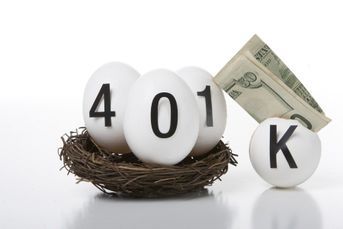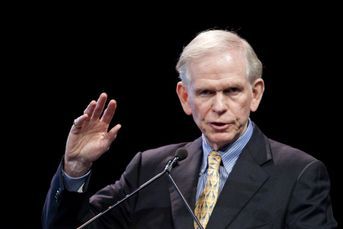Good value: Betting on Buffett and Malone
Portfolio manager Wally Weitz's bets on Warren Buffett and telecoms mogul John Malone have helped his fund produce the best risk-adjusted performance among U.S. value funds in the past five years.
Wally Weitz likes to invest with billionaires he’s known a long time. He’s been a shareholder for more than 35 years in Berkshire Hathaway Inc. (BRK/A), run by his Omaha, Nebraska, neighbor Warren Buffett, and has held stakes in companies run by media mogul John Malone for more than 20.
The investments helped Weitz’s Partners III Opportunity Fund (WPOPX) produce the best risk-adjusted performance among U.S. value funds in the past five years, according to the Bloomberg Riskless Return Ranking. The $901 million fund had below-average volatility and the second-highest absolute return among 283 vehicles with at least $500 million in assets.
Weitz has always looked for companies whose stocks are cheap compared with the cash flow he expects them to generate, a common metric for value investors. Over time, he has come to believe that finding management teams that know how to redeploy any excess cash intelligently is critical to investment success.
“Warren Buffett and John Malone could not be more different, but both of them know how to create more than a dollar of value for every dollar they reinvest,” Weitz, 64, said in a telephone interview.
The Opportunity fund has the most flexibility of his firm’s five equity funds because it regularly shorts, or bets against, stocks. Unlike many short sellers, Weitz typically doesn’t bet against individual stocks. He wagers against baskets of equities using index options and exchange-traded funds, a technique that allows him to put more money into his favorite stocks while hedging market risk, tempering volatility.
Three Decades
Weitz’s fund operated as a private partnership from June 1983 to December 2005, when it became a mutual fund. Over its three decades, the fund has returned 14 percent a year, compared with 11 percent for the Standard & Poor’s 500 Index, according to Weitz’s website.
Bloomberg’s risk-adjusted return is calculated by dividing total return by volatility, or the degree of daily price-swing variation, giving a measure of income per unit of risk. The returns aren’t annualized.
Partners III Opportunity Fund returned an adjusted 5.1 percent in the five years ended Aug. 30. It had lower volatility than 95 percent of similar funds.
Like many value investors, who pick assets that they deem cheap relative to peers, Weitz isn’t too concerned with producing steady results. An investor must ride out the inevitable periods when his style is not in favor, he said.
Accepting ‘Lumpy’
“We agree with Warren on this one,” Weitz said, referring to Buffett. “We would rather have a lumpy 14 percent annual return than a smooth 10 percent.”
Two funds run by Donald Yacktman, founder of Austin, Texas-based Yacktman Asset Management Co., ranked second and third in risk-adjusted performance in the past five years. The $12.3 billion Yacktman Fund (YACKX) and the $10.6 billion Yacktman Focused Fund returned 4.4 percent. Both were near the top in total return with below-average volatility.
Weitz, who manages about $5.3 billion in funds and separate accounts, has run his Omaha-based firm, Weitz Investment Management, since 1983. He has invested in Buffett’s Berkshire Hathaway for clients since 1976. His office and Buffett’s are about five miles apart.
Weitz, who has a bachelor’s degree in economics from Carleton College in Northfield, Minnesota, recalls going to a Berkshire annual meeting in the 1970s in the lunch room of a local insurance company, where he was among the handful of investors present. Today the meetings draw tens of thousands.
No Secrets
“We see each other periodically, we’re friendly, but he doesn’t call and give me secrets,” Weitz said about his relationship with Buffett.
From the end of 1976 to June 30, Berkshire returned 23 percent annually, according to data compiled by Max Olson, an investor who edited a book of Buffett’s letters to shareholders. The S&P 500 Index returned 11 percent a year.
In the past five years, Berkshire rose about as much as the S&P 500. The stock accounted for 4.1 percent of the Opportunity fund as of June 28, according to data compiled by Bloomberg.
Weitz’s value style of investing is similar to Buffett’s, said Bradley Alford, founder of Alpha Capital Management LLC in Atlanta, who owns shares in the Opportunity fund.
“He’s Buffett with a lot less zeros,” Alford said in a telephone interview.
Golden Touch
Weitz first met Malone at a media conference in the late 1980s, when the executive was running Denver-based Tele-Communications Inc., and was struck by his grasp of the cable industry. Today, Malone’s assorted publicly traded companies hold stakes in businesses from satellite radio company Sirius XM Radio Inc. (SIRI) to home-shopping network QVC Inc. Malone is worth $6.4 billion, according to the Bloomberg Billionaires Index.
“Everything John Malone has touched over the past five years has turned to gold,” Christopher Marangi, a portfolio manager at Rye, New York-based money manager Gamco Investors Inc. (GBL), said in a telephone interview.
Since Malone’s Liberty Media Corp. (LMCA) was spun off from AT&T in 2001, his companies have generated annual returns of 17 percent to 18 percent a year, Marangi estimated. The aggregate returns have probably been higher since the 2008 bear market, said Marangi, who owns stakes in all of Malone’s companies.
DirecTV Stakeholders
Weitz called Malone a master at “dreaming up ways to separate out valuable businesses from less valuable ones.” Two of his firms, Englewood, Colorado-based Liberty Interactive Corp. (LINTA) and London-based Liberty Global Plc, were among the biggest contributors to the fund’s performance in the past five years, according to data compiled by Bloomberg. Liberty Interactive gained 88 percent in that span; Liberty Global more than doubled.
One of Weitz’s largest positions, El Segundo, California-based DirecTV (DTV), counts both Malone and Berkshire Hathaway among its five biggest shareholders.
Weitz’s fund isn’t immune to slumps. It fell 13 percent in 2007, worse than 99 percent of peers, dragged down by financial stocks such as New York-based insurer American International Group Inc. (AIG), which had to be rescued by the U.S. government in 2008 amid losses.
The 2007-2009 economic crisis convinced Weitz that financial firms were taking risks he never appreciated.
“I would characterize our mostly happy, 30-year experience investing in financials as a bad idea we got away with,” Weitz said.
Safety Margin
The manager now demands a greater margin of safety before he will invest in financials, said Kevin McDevitt, an analyst with Chicago-based Morningstar Inc. (MORN)
Wells Fargo & Co. (WFC), the largest home lender, was the Opportunity fund’s third-biggest equity holding as of the end of June. The San Francisco-based bank has “fewer headaches” than its competitors, Weitz said.
Should interest rates keep rising from their May lows, Wells Fargo’s pool of cheap deposits will buoy earnings, Weitz said. In a 2012 presentation, Wells Fargo said it had a lower average cost of deposits than any large bank.
“The fact that Warren is a big owner gives me extra comfort,” said Weitz. Berkshire is Wells Fargo’s largest shareholder, according to data compiled by Bloomberg.
Weitz tries to buy stocks at a steep discount and sell them as they approach his estimate of fair value. The process can lead him to sell too soon.
In the first quarter of 2011, Weitz sold Cabela’s Inc. (CAB), a Sidney, Nebraska-based retailer of hunting and fishing equipment, taking a substantial gain, according to a shareholder letter in a regulatory filing.
Selling Early
“We would gladly own the stock again at the right price,” Weitz wrote.
The shares have more than doubled since March 31, 2011.
“Given our value orientation we often get out early,” Weitz said in the interview. “You have to be philosophical about that.”
Weitz, who is in the process of selling his firm to his employees, said he has no intention of leaving any time soon. He said he’s confident that his approach still works.
“Human nature has not changed,” he told shareholders in a 2009 letter. “People acting out of fear and greed cause assets to be mispriced from time to time. Our business is to take advantage of this mispricing.”
(Bloomberg News)
Learn more about reprints and licensing for this article.








